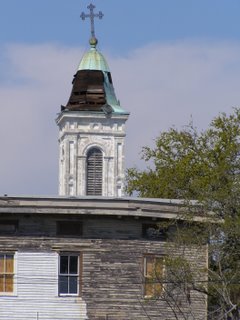Hurricane Relief: post mortem
 On Sunday evening, back from the trip, I was glad to bathe in my own tub, crawl into my own comfy bed, and sleep next to my husband, but I felt a great emptiness waking the next morning to the familiar and heading to a sterile office rather than going to gut houses. I woke with my heart in the 9th Ward, and it has followed me around ever since.
On Sunday evening, back from the trip, I was glad to bathe in my own tub, crawl into my own comfy bed, and sleep next to my husband, but I felt a great emptiness waking the next morning to the familiar and heading to a sterile office rather than going to gut houses. I woke with my heart in the 9th Ward, and it has followed me around ever since.
This is partly circumstantial—I was there for three days and feel changed because of the brief trip, so it's natural to still be thinking about it. But there's also an emotional reality that steps beyond the circumstantial—that is, I didn't just wake Monday thinking about the Ninth Ward because I was there but because it's right and necessary to do so. When I woke at 4:30 Monday morning with a Katrina cough seeking ibuprofen, it felt weird walking in the dark through my familiar home, confident that everything was where it was supposed to be. It felt weird to have a confident familiarity. It felt weird to have a home.
But we must press on in action, not despair. One of our number said she never thought of the situation as potentially hopeless until she saw the Ninth Ward itself. Indeed we may never see this thing fixed in our lifetimes or even in this age, but we must hope in the God who will fix it one day, at least for the glorious age to come.
The very beginning of Genesis 1 can teach us something amazing here: when the creation was a dark and formless void that to our eyes would have looked like utter chaos, the spirit of God was yet hovering, doing something that eventually finished wise, right, and good. We may not see the activity, may not understand it at all, but I believe we can be confident in the Lord of the universe to not forsake His creation. One day and for all eternity, He will make it right. When we look at this kind of destruction, it seems all the more amazing that He will do it. And such assurance energizes me to work in the meantime. As long as He tarries, let us partner with Him in the care of His creation.
The whole of Habakkuk speaks to this same paradox: the prophet is frustrated over God's apparent lack of action as oppressors threaten Israel, and he asks some rather indignant questions of God in the face of it. He asks questions like "Isn't this pretty much reversing the promises You made to us? Isn't this diminishing Your glory? Don't you care about this injustice?" and then just sits there awaiting answer. God's gracious responses point Habakkuk to His glory and governance—He rules all things perfectly, though it may honestly not always look like it at the moment. I'm not sure Habakkuk himself really gets it by the end, but he starts moving that way, singing a fantastic song that we might apply to Katrina's destruction well: even if this place never grows back, God is still good and deserves worship because He is the only joy of my heart and the only security for my feet.
So let us proceed with hope, knowing He will finish it one day for His own glory and our good. We will be more glad on that day for our temporal obedience. How gracious He is to join us in His work! In contemplating a higher and higher view of God and in doing such God-honoring work is our hope and joy.

1 comment:
aintnogod
Post a Comment